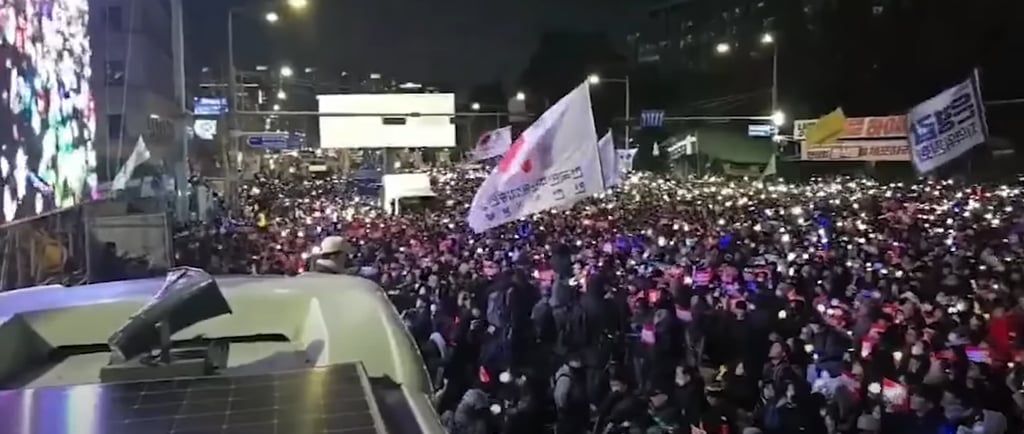South Korea in Turmoil: President Yoon Faces Impeachment After Martial Law Sparks Protests | Breaking News
Discover the shocking political crisis in South Korea—martial law, mass protests, and President Yoon's impeachment explained.
12/14/20242 min read


Incredible Scenes from South Korea: The End of South Korean President After Emergency 🚨
South Korea is witnessing an unprecedented political storm that has gripped the nation and shocked the world. From the declaration of martial law to mass protests, here's everything you need to know about this unfolding drama.
📜 The Declaration of Martial Law and Immediate Uproar
On December 3, 2024, President Yoon Suk Yeol declared martial law, citing the need to curb threats from "anti-state forces". However, the announcement was met with widespread outrage across South Korea. 🪧
Protests Erupt Nationwide: Citizens flooded the streets, lighting candlelit vigils 🕯️ and chanting slogans demanding President Yoon's resignation.
Government’s Response: Just hours later, the overwhelming opposition forced President Yoon to rescind the martial law declaration.
📷 Scenes of protests resemble a fiery call for democracy.
🎥 Shocking Scenes in Seoul
Protesters in downtown Seoul carried banners 🪧 demanding justice and shouting, "Restore democracy!" The once bustling streets turned into a battlefield of ideals as riot police clashed with demonstrators. 🚨
🏛️ South Korean Parliament Steps In
Amid the chaos, the National Assembly wasted no time in addressing the crisis. 🏛️
Emergency Votes: On December 14, Parliament overwhelmingly voted 204 out of 300 in favor of impeaching President Yoon.
Legal Consequences: The motion will now move to the Constitutional Court, which has six months to finalize its decision. During this time, Prime Minister Han Duck-soo will act as president.
Reason for Impeachment: President Yoon was accused of violating the Constitution by attempting to subvert democratic principles.
🔄 Political Fallout and High-Profile Resignations 📝
The declaration of martial law and its immediate withdrawal created ripples in South Korea’s government:
Key Resignations:
Jeong Jin-seok, the Chief of Staff, stepped down.
Defense Minister Kim Yong-hyun also resigned, citing accountability for the crisis.
😔 These resignations reflect internal dissent and the growing unpopularity of Yoon's administration.
Fractured Leadership: Yoon’s political allies began distancing themselves as the scandal unfolded.
🌏 International Reactions: What Is Happening in the USA? 🇺🇸
The United States, South Korea’s strongest ally, responded swiftly to the political chaos:
Phone Call with Joe Biden 📞: Acting President Han Duck-soo reassured U.S. President Joe Biden about South Korea’s commitment to regional security.
Global Concerns: The U.S. expressed concerns about stability in the region, emphasizing that political unrest could weaken global efforts to counteract North Korea.
🗳️ Public Protests: Democracy on Trial
The streets of South Korea remain alive with protests. 🪧 Citizens, young and old, have united to demand accountability and transparency from their leaders. ✊
Candlelit Vigils 🕯️: Protesters held peaceful demonstrations with candles, a symbol of their resilience against oppression.
Online Activism 📱: Social media platforms are buzzing with hashtags like #DemocracyNow and #ResignYoon as South Koreans voice their concerns globally.
🔍 FAQs About South Korea's Crisis
❓ 1. What led to martial law in South Korea?
President Yoon declared martial law, citing unspecified "threats" from anti-state forces. However, many saw it as a power grab, triggering public outrage.
❓ 2. What happens after impeachment?
The Constitutional Court will decide whether the impeachment is valid. If upheld, Yoon will be permanently removed from office.
❓ 3. How are U.S.-South Korea relations affected?
The U.S. has reassured its support for South Korea’s security policies, but concerns over instability remain.
❓ 4. Who is running the country now?
Prime Minister Han Duck-soo is serving as acting president during the impeachment process.
❓ 5. How are South Koreans responding?
Citizens have turned to mass protests and online movements to demand transparency and accountability from their leaders.
🌟 Conclusion: The World Is Watching 👀
South Korea’s political turmoil is a reminder of the strength of democratic values and the importance of protecting them. As the nation awaits the Constitutional Court’s decision, the focus is on whether its leaders will uphold the principles of justice and accountability. 🗳️